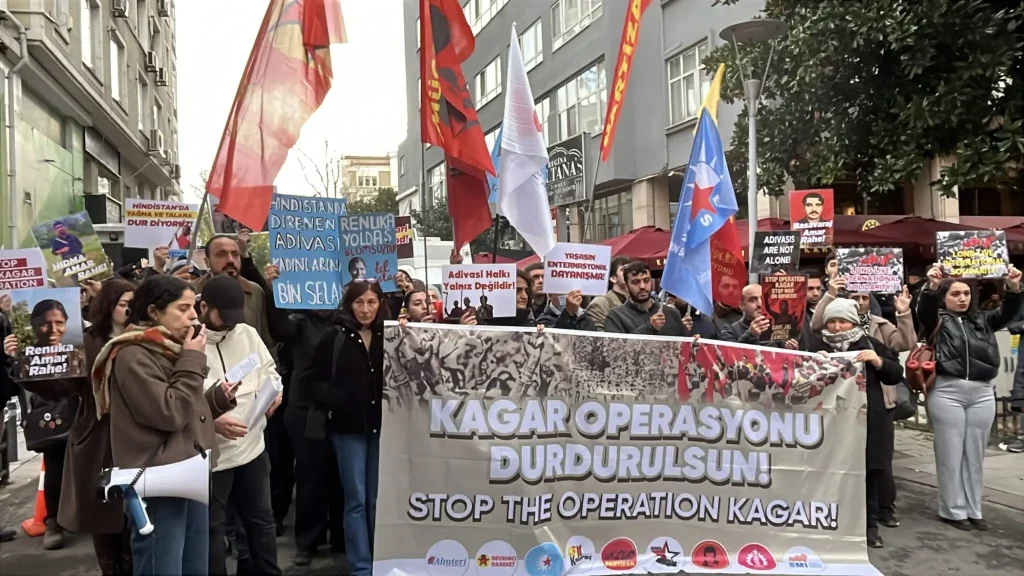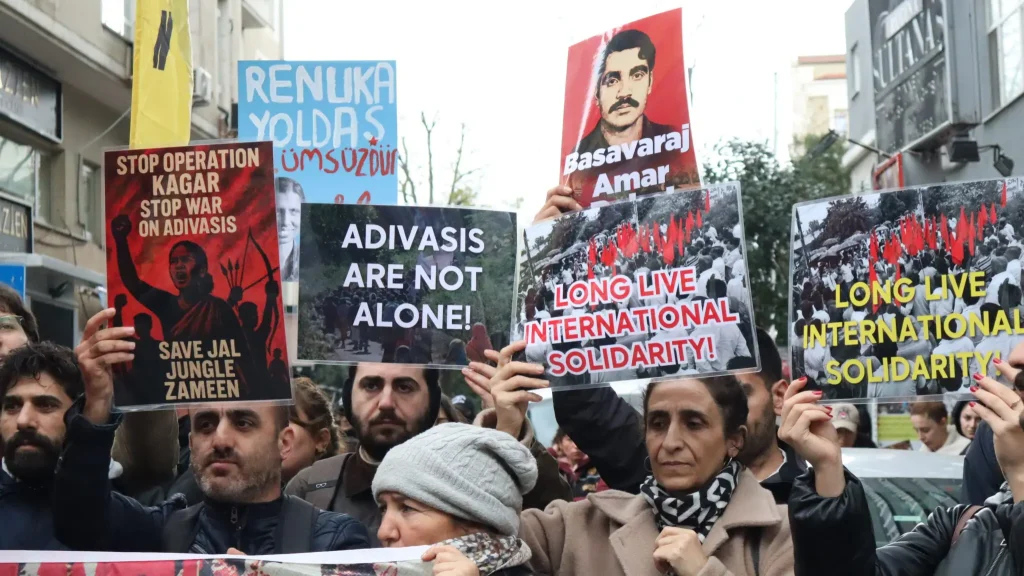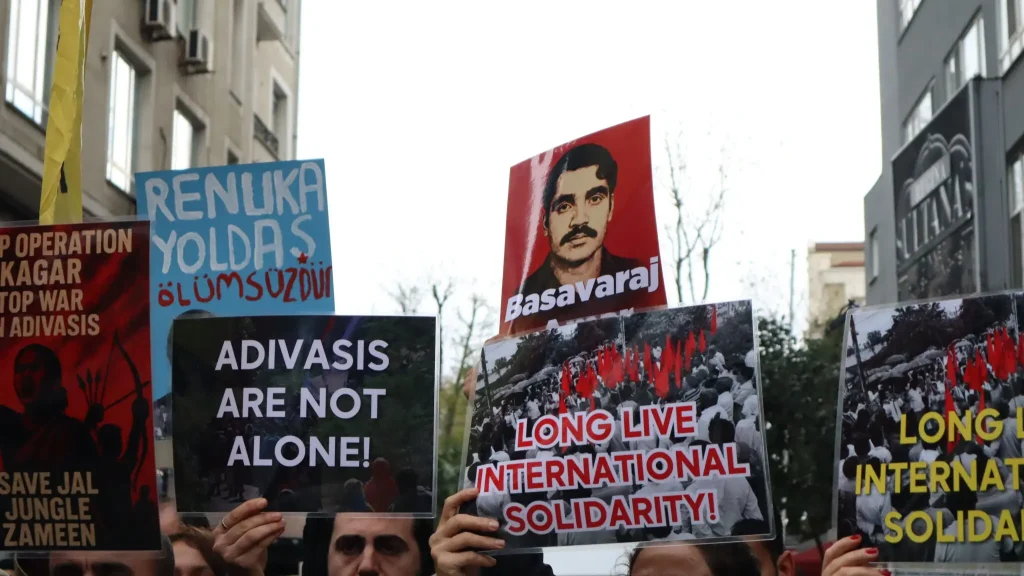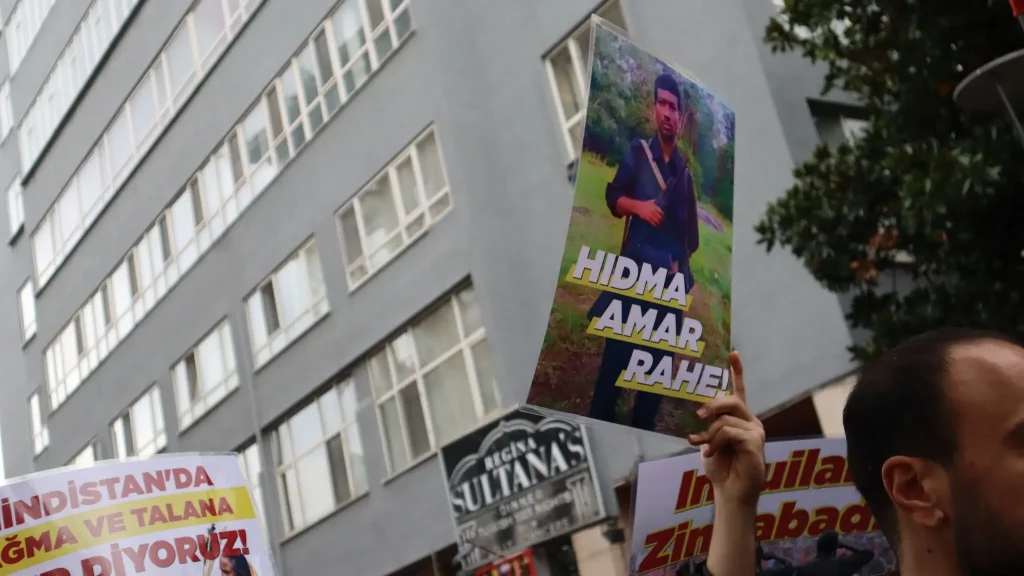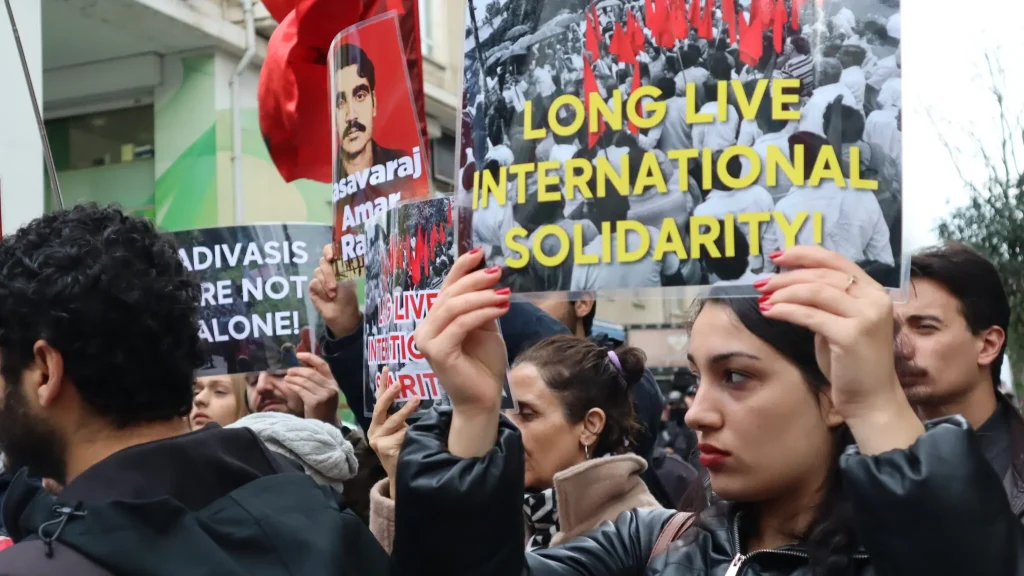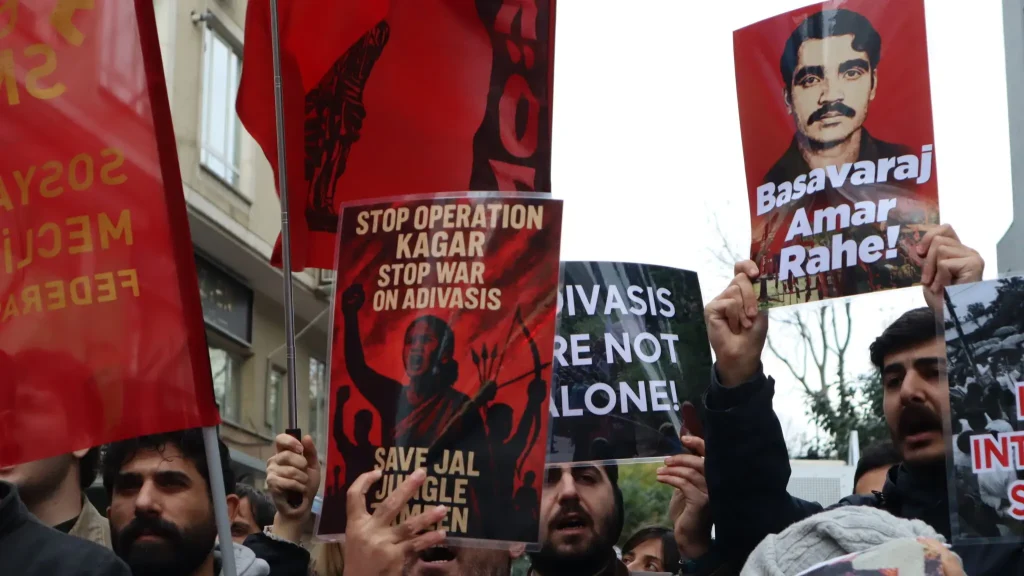Our Central Committee member and Secretary of Dandakaranya Special Zonal Committee, Comrade Hidmal, and his 5 comrades were arrested by the Andhra Pradesh Police on November 15, tortured for three days and killed on November 18. Comrade Hidmal went for treatment through a timber merchant from Vijayawada on October 27. After that, a few others went. The police spread a fabricated story that they were killed in an encounter in the Maredumilli forest area of Alluri Seetharamaraju district by capturing and killing six unarmed Comrades Hidmal and his associates. On November 19, the police announced that 7 more Maoists were killed in an encounter in Rampachodavaram mandal of the same district. In the incident of November 19, unarmed AOV S.Z.C. member Comrade Shankar and six others were arrested and killed in a fake encounter. The Dandakaranya Special Zonal Committee is offering revolutionary salutes to the comrades who lost their lives in the killings committed by the enemy armed forces on November 18 and 19. It is vowing to fight till the last breath for the realization of their aspirations. It expresses its deepest condolences and sympathy to their family members and relatives.
In both these incidents, it is now understood that the people who took them out were police informers. On November 9, a company party committee member named Kosal escaped from our forces and surrendered to the Telangana police. He knew the travel details of Comrade Hidmal and that he was outside. As soon as Kosal fled, our comrades informed Comrade Hidmal about this and asked him to come inside immediately. After receiving this information, he would have been ready to come inside with his team. When the people who took him informed the police about this, the police arrested Comrade Hidmal and the other 5 people with him, killed them and fabricated an encounter story. Similarly, when the people who took Shankar also informed the police, the Comrade Hidmal team and Comrade Shankar team were arrested at the same time and tortured and murdered by the Andhra Pradesh police. In both these incidents, the three responsible for the arrest of 50 Maoists in Vijayawada, N.T.R., Konaseema, Eluru and Kakinada districts were a wood trader-furniture trader from Vijayawada, a builder-civil contractor, and a contractor doing ITDA work in Alluri Seetharamaraju district. Kosal, who fled from us along with them and informed the police about the whereabouts of our comrades, was also responsible.
After Kosal fled from us, the police caught our comrades and killed 13 of them and arrested 50.
Among those arrested were neither Comrades Devji nor Sangram (Malla Rajireddy). They did not enter into any agreement with the police to save their lives, and Comrade Devji did not give information about Comrades Hidmal and others to the police.
All these facts are clearly known to the intelligence agencies of the Central Government, the state intelligence agencies of Andhra Pradesh, Telangana, Chhattisgarh and Odisha. The intelligence agencies of the Central and State Governments, in coordination with each other, killed Comrades Hidmal, Shankar and others and arrested 13 people and arrested 50 people. This was not an operation carried out by the Andhra Pradesh Police alone. This is a joint operation of the central and state governments. The mastermind behind all this is the trusted servant of the country and foreign corporates, the murderer and the bloodthirsty Union Home Minister Amit Shah.
The facts being as follows, when Comrade Hidmal was killed and the people were extremely angry with the central and state governments and the police, without questioning the central and state governments and the police who were responsible for these murders, without demanding a judicial inquiry into these murders and punishment of the traitors, former MLA Manish Kunjam and Soni accused Comrade Devji of being responsible for the murder of Comrade Hidmal, it is a conspiracy statement. ‘Comrade Hidmal and 50 others were taken to Andhra Pradesh by Devji, who said that he would surrender, and took them all to Andhra Pradesh, killed Hidmal, and got 50 others arrested,’ Manish Kunjam made a conspiracy statement on November 21.
The Brahminical Hindutva fascist RSS-BJP central and state governments are waging a war of attrition, with the aim of turning the country into a 'corporate Hindu State' and eradicating the Maoist party and revolutionary movement by March 31, 2026. As part of this, the Central Committee members of our party and the State Committee members of various states are being arrested.
The central and state governments are jointly carrying out round-up and elimination raids and making arrests to eradicate the party. As part of this, our party's general secretary Comrade Basava Raju and many other central and state committee members have been murdered. The remaining comrades Ganapati, Devji, Misir Bisra, Sangram and other central and state committee members will be eliminated. The central government, Chhattisgarh, Maharashtra, Telangana, Andhra Pradesh, Odisha, Jharkhand, Bihar and Madhya Pradesh States are continuously making announcements through visual and audio media that they will eradicate the party. This is so that even the blind can see it and the deaf can hear it and the general public can understand it. However, the fact that former MLAs Manish Kunjam and Soni Sodi are targeting Devji instead of targeting the central and state governments is part of a huge conspiracy.
Since April this year, people across the country have been campaigning to stop the Operation Kagaar, stop the massacre in Bastar, and for the central and State governments to hold peace talks with the Maoists. However, in an interview given to Bastar Talkies in May this year, Manish Kunjam shamelessly lied and justified the massacre of tribals in Bastar by the armed forces of the central and state governments in the name of Kagaar.
Since May 2024, the central and state armed forces have been killing tribal rural people in many places in Bastar. On December 13, in a raid in the vicinity of Kalaja-Dondruveda, they deliberately killed 5 villagers including Comrades Karthik and Rami. In February, they encircled the surroundings of Thodka village and killed 7 villagers and a party member, Neelkanth. On March 31, they caught and killed an unarmed S.Z.C. member, Comrade Chayte, in Bel Nar village in Indravati area. Later, they caught and killed two rural youths along with Comrade Sudhir in the same area. In many such incidents, the central and state governments have killed the rural people.
While honest individuals, social organizations and forces are exposing this murder and massacre, declaring all these as genuine encounters according to Manish Kunjam's plan is to justify the massacre of the tribals. Now, instead of targeting the central and state governments for the murder of Comrade Hidma, without demanding and agitating for a fair trial and punishment of the traitors, targeting Comrade Devji for it is part of a huge conspiracy.
Such statements are the result of him becoming a middleman for the domestic and foreign corporate companies mining in Bastar for the corporatization of forests in Bastar. This is not just targeting Devji, but is part of attacking the entire Maoist party and revolutionary movement.
This statement is part of participating in the planned psychological warfare waged by the intelligence agencies to attack the Maoist party, the party leadership and the revolutionary movement and create confusion and distrust in the revolutionary camp. That is why we strongly condemn this statement.
We call upon the people to thwart the conspiracies being made and intended to be made by Manish Kunjam, who has become an agent of corporatization / domestic and foreign corporates, in collaboration with intelligence agencies against the revolutionary movement in Bastar.
Although Sonisodi, who attended Comrade Hidmal's last rites, rightly denied that this was a fake encounter and that it was a murder, we strongly condemn her statement that Devji was caught by the police and gave information about Hidal to the police to save his life. It is highly objectionable to make such statements about the murder of Comrade Hidmal without gathering facts from the public organizations in Andhra Pradesh and Telangana. If he wants to stand on the side of the people and the tribals, we demand that he withdraw this statement and declare that he made the statement in haste without knowing the facts related to this incident.
After learning that Comrade Hidmal and other comrades were in the possession of their police informers, Chhattisgarh Deputy Chief Minister Vijay Sharma went to Puvwarti village. There, he made an announcement to Comrade Hidma’s mother demanding his surrender. The enemy clearly knew that Comrade Hidma would not surrender under any circumstances, so he made this announcement. This is part of the evil plan to justify the murder by saying that Hidma had to be killed because he had been asked to surrender but could not surrender. On the other hand, Comrade Hidma’s attempt to surrender to the enemy is part of the evil plan to tarnish his history.
Appeal to the people!
We call upon the people to launch a nationwide mass movement to hold a judicial inquiry into the murder of Comrade Hidma (Maredumilli) and Comrade Shankar (Rampachodavaram), to punish the culprits severely and to stop the ongoing Kagar war for the corporates.
We appeal to the public lawyers and rights activists to provide legal aid to the 50 comrades arrested in Vijayawada and other cities and to work for their release.
The Brahminical Hindutva fascist RSS-BJP central and state governments are trying to turn the country into a ‘Corporate Hindu Desam’
Our party is resisting the operation Kagaar that is killing people from the Central Committee members to the rural people. In this situation, it is the duty of all of us to fight against the operation Kagar under the leadership of our party and to stand firm in the revolutionary movement for the realization of the aspirations of the martyrs. Due to the intensity of today's operation Kagar, we are in a position to not be able to make regular statements. That is why do not be confused and distrusted by the false statements of people like Manish Kunjam.
Do not be disappointed by the surrenders of revolutionary traitors like Sonu and Satish, and by the surrenders of others. In the future too, the intelligence agencies of the central and state governments will carry out many evil false campaigns against the Maoist party, against the party leadership, and against the revolutionary movement through their agents like Manish Kunjam in the country and in the Dandakaranya.
Do not be confused by them.
We appeal to all the people to know the facts through our party workers who come to the villages on any issue and to stand firm in the revolutionary movement.
With revolutionary greetings,
Official Spokesperson of Vikalp,
Dandakaranya Special Zonal Committee,
Communist Party of India (Maoist)
















